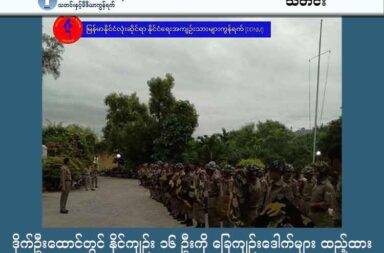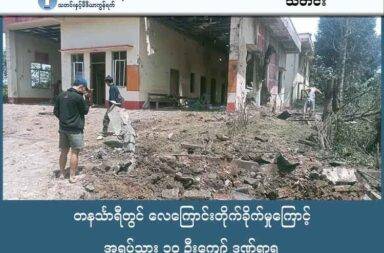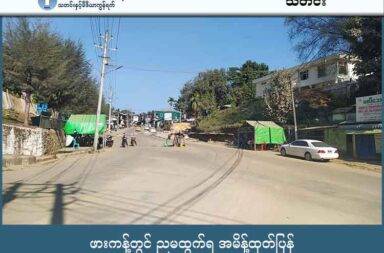Kuki Community Demonstrates Against VFV Land Law
‘Because of this law, we will lose our land,’ a Kuki youth representative says.
By NETWORK MEDIA GROUP (NMG)
Wednesday, March 13, 2019
More than 400 ethnic Kuki people in Sagaing Region’s Tamu Township protested Burma’s Vacant, Fallow, and Virgin (VFV) Land Management Law on Monday, the deadline to register land.
According to Kuki Youth Network chairperson Say Gin, Kuki land owned through customary law could be seized under the VFV land statute.
“We have to apply to keep the land within six months of the law being imposed. It is difficult for us. Because of this law, we will lose our land,” he told NMG. “We used to work in these forests and mountains for our survival. With this law, we cannot work on our own land. We need to protect our land.”
Those who protested on Monday came from 11 villages, and chanted slogans declaring “there is no VFV land in the Kuki area,” and “land is for everyone, not for your interests.”
Demonstrations were held in the communities of Zayti, Hpai Lin, Ton Kyaw and Kyunpintha, with around 100 people protesting at each site.
The VFV land law was imposed on September 11, 2018. March 11 marked the end of the six-month period for farmers to apply for complicated land registration documents, which are often impossible to obtain for those who have been working the land for generations, particularly in ethnic states.
“We have a traditional way we own the land. We only have customary ownership,” Say Gin explained. “There are mountains around the village. We have village land. If we need wood and bamboo to build a house in the village, we can take those things from there. According to our tradition, we all own the land together.”
However, under the VFV land law, these lands will be considered vacant or virgin lands, he added, since the village does not have the documentation required by the government to prove their ownership.
“We want this land law to be withdrawn,” Say Gin said.
According to Article 30(a) of the VFV land law, registered farmlands, traditional and customarily owned lands, religious lands, and land used for social welfare, education, healthcare, and transportation reportedly won’t be recognized as VFV land.


